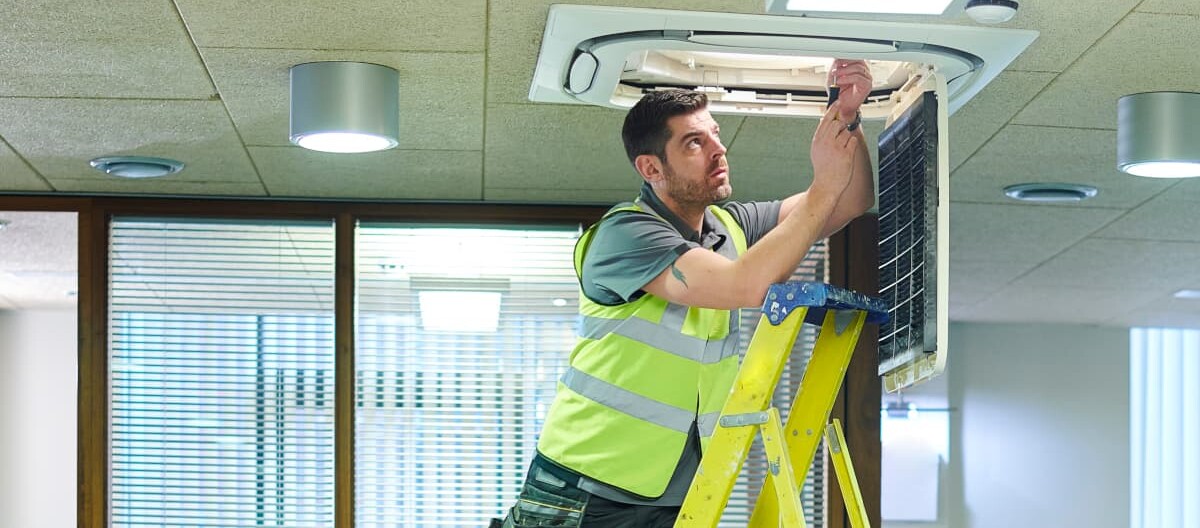Smart air conditioning systems are becoming increasingly visible
The manufacturers of air conditioning and refrigeration technology have been offering smart features for their commercial systems for many years; the industry can definitely view itself as a pioneer in this area. Most brands can be optionally interlinked and controlled via building management systems or apps. Nevertheless, according to the forecasts by Building Climate Institute (FGK), only just under ten percent of the currently operational air conditioning units and air conditioning systems are equipped with smart features.
This is primarily a result of the long 20 to 30 year service life that passes before these devices are obsolete. For new installations, nearly half of commercial customers would still choose smart options. Assuming they have smart features, BAFA grants have existed for several years in the form of heat pumps for the installation of air conditioning systems.
Basic features of smart air conditioning devices and systems
A fundamental difference between air conditioners with cooling and heating functions are air conditioners that can also ventilate rooms. Both versions have a variety of smart features. What does "smart" mean in the context of these products? Of course, a user interface must first be available on the smartphone or another independent device which can be used as a controller. Yet, that alone does not make it a smart system: A poorly designed air conditioning and ventilation system is not smart just because you can communicate with it.
According to the Fachverband (trade association), a smart ventilation and air conditioning system must meet at least the following requirements:
- Correct design according to user needs for indoor air quality and thermal comfort
- On-demand operating mode
- Online or app based user interface
- Interface for load management
- Maintenance features
- Upgradeability
- Data privacy
Present your company on our platform!
The advantages:
- International audience and visibility
- Set-up in 5 minutes
- Numerous options and services through individual content
Examples of smart features
The standard features of smart, commercial air conditioning units and systems include smart on/off functions, temperature setpoints adjustments, and automatic output adjustments at fixed intervals. Modern systems can also do much more: There are brands that can measure the number and locations of people present, the CO₂ pollution in the indoor environment, and align their cooling performance and ventilation to these parameters.
These requirement regulations are sought after where many people are spending time with varying occupancy rates. Examples include event rooms, schools, offices, and fitness centers. Unoccupied areas can remain warmer in summer while high-traffic areas are cooled down without the system fan blowing directly on people. Humidity controls are useful in damp rooms, such as bathrooms and swimming pools.
Sensors can detect open windows and deactivate the power so that the technology does not operate pointlessly against warm air masses from the outside. Most recently, since the COVID-19 pandemic, air purification has played a major role in modern room air conditioning units beyond pure ventilation functions. For example, there are brands that filter or neutralize potential airborne pathogens.
Another smart aspect includes optimization regarding power grids. These days, many devices can now score with so-called network-friendly features. They not only measure how much electrical energy is required but also the corresponding available price. In addition, they automatically throttle their output during peak periods (with a slight loss of comfort) and take advantage of times when electricity is cheaper.
If something is "wrong," for example if a filter needs to be changed or damage is likely, smart air conditioning systems can also display and automatically transmit it to the service company. This is particularly relevant for maintenance and cleaning. Of course, these settings or system changes can also be performed manually via an app and remotely.
What are the advantages of a smart air conditioning control?
The installation of a smart air conditioning offers many advantages for commercial users due to its smart features:
- It makes a significant contribution to the energy efficiency and the achievement of CO₂ targets in the building sector
- It guarantees more comfort and saves personnel during operation
- It consumes less electricity and therefore operates more cost-efficiently
- It can be integrated with other smart devices


